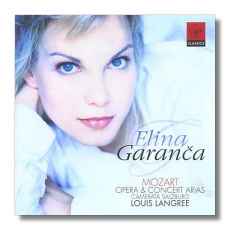
The Internet's Premier Classical Music Source
Related Links
- Mozart Reviews
- Latest Reviews
- More Reviews
-
By Composer
-
Collections
DVD & Blu-ray
Books
Concert Reviews
Articles/Interviews
Software
Audio
Search Amazon
Recommended Links
Site News
 CD Review
CD Review
Wolfgang Mozart

Opera & Concert Arias
- Chi sa, chi sa, qual sia, K.582
- Basta, vincesti… Ah, non lasciarmi, no, K.486a
- Alma grande e nobil core, K.578
- Misero me… Misero pargoletto, K.77
- Ch'io mi scordi di te?… Non temer, amato bene, K.505
- Arias from La clemenza di Tito, La finta giardiniera (2), Così fan tutte (2)
Elina Garanča, mezzo-soprano
Frank Braley, piano
Camerata Salzburg/Louis Langrée
Virgin Classics 09463-32631-2 DDD 62:15
Mozart is good for your voice, most singers say, but he also exposes your weaknesses… not just in technique, but also in feeling. Fortunately, Latvian mezzo Elina Garanča is not embarrassed by this Mozart recital, recorded (appropriately enough) in the Salzburg Mozarteum. It leaves one wanting more, however – more Mozart, and more from Garanča, who comes across as too restrained.
Garanča is a young singer with many years ahead of her, one hopes. Her mentors include the formidable Virginia Zeani. In Vienna, she recently appeared in a strange but acclaimed production of Werther, and this was preserved on DVD. (Charlotte apparently has become a signature role for her.) Nevertheless, her repertoire seems to have focused on Mozart, Rossini, and even back to Vivaldi. The Virgin Classics recording of that last composer's opera Bajazet, in which Garanča is a participant, really is something worth hearing.
But back to the matter at hand. Garanča has selected a program of less familiar arias, for the most part. This is good planning, I guess, because it makes it less likely that she will be negatively compared to Madame X, Y, or Z. Many of the characters she is portraying have a case of the mopes. Timante, for example, the hero in the concert aria "Misero pargoletto," has accidentally married his sister. Didone, in "Ah, non lasciarmi, no" is grappling with the threat of her beloved's desertion. Garanča is at her best here; she conveys these wilting emotions well. Not all of Mozart's women are doormats, however. Both Fiordiligi and Dorabella in Così fan tutte are made of stronger stuff. The former, in fact, compares herself to the rock that remains fixed against the winds and the storm. Donna Laura, in the concert aria "Alma grande e nobil core" vows revenge against the man who did her wrong. Garanča's response to this cast of characters is too generalized, and definitely too docile.
The voice is an attractive one, although it can turn hollow in the lower registers. That, and a tendency to scoop, occasionally makes Garanča sound like Leontyne Price near the end of her career. (Another similarity would be the changes in vocal color as she goes up the scale.) The florid music is sung cleanly, and high notes are secure; Garanča seems to be one of those always useful mezzos with a strong top (as opposed to a soprano whose lower range is well developed). The only real problem I have with this recital, then, is Garanča's reticence and her unwillingness to shade her characters more. If you're going to sing both Dorabella and Fiordiligi on the same CD, you had better make sure you're not turning them into identical twins!
Like Garanča, pianist Braley is low-key (no pun intended) in "Ch'io mi scordi di te?" Langrée and the Camerata Salzburg make no particular impression either way. (A stronger orchestral accompaniment might have helped Garanča's interpretations.) The booklet contains texts and translations. The engineering is unremarkable.
The infrequently recorded repertoire is what pushes this disc into the "recommended anyway" category.
Copyright © 2006, Raymond Tuttle




















